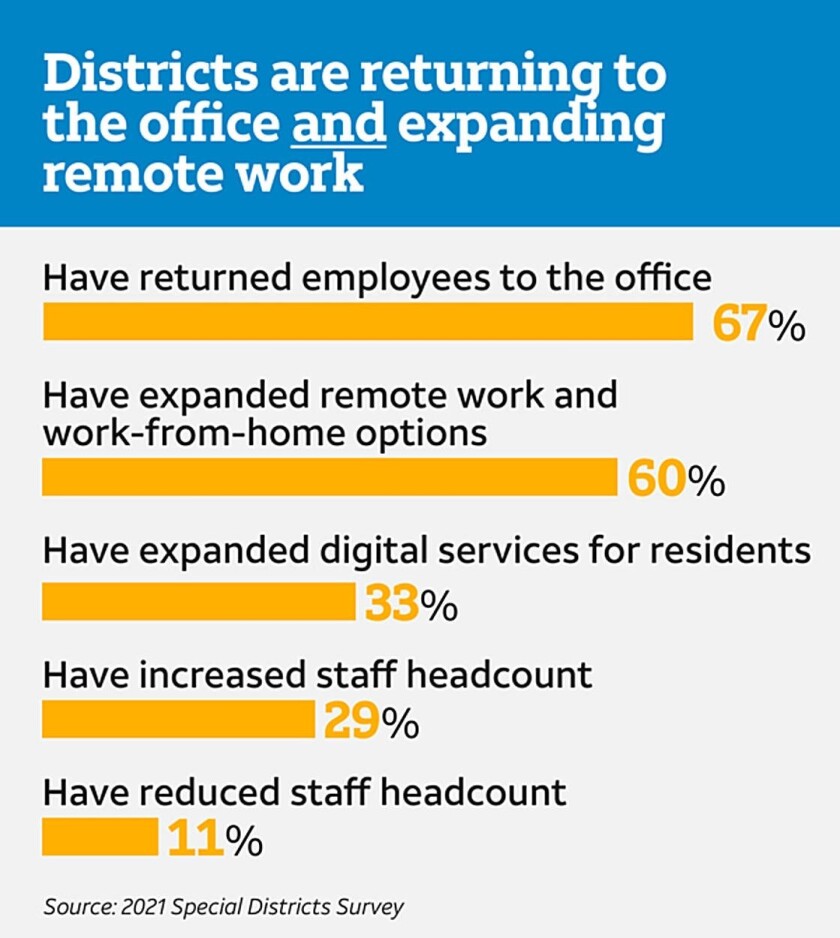We’re accepting submissions now in three categories:
- Constituent services: Using technology to improve public-facing service delivery by making physical services available online, deploying new constituent engagement solutions and enhancing user experience
- Internal operations: Using technology to streamline business processes, enhance security measures and improve efficiency.
- Leadership: Recognizing innovative and effective leaders who are driving IT modernization and transformation.
Navigating a New Environment
One outcome of the pandemic is more flexibility for district employees. Although the bulk of respondents said their district has brought employees back into the office, a majority also said they have expanded remote work and work-from-home options for staff. In addition, the survey found encouraging news on the hiring front, with about a third of respondents saying they had increased staff headcount over the past 12 months. Districts are evolving their services, too. A third of respondents said their district has expanded digital services for residents.
Results from our annual Special Districts Survey, conducted in late 2021, show the permanent impact of the COVID-19 pandemic on how special districts work and deliver public services. The survey polled more than 200 special district officials in December on a range of topics, including evolving workforce models and staffing levels.

Our newly released special districts report explores how districts are tapping into federal relief funds, creating new revenue sources and forging innovative partnerships to prepare for the future. The report is packed with great ideas and practical advice that can help your district generate funds for modernization and reduce the cost of launching new technologies. You’ll see how:
- The San Joaquin Regional Transit District in Northern California used federal relief funds to keep buses running while it redesigns services to match new ridership trends.
- The Bremerton Housing Authority in Washington State generates important revenue by performing contract work for other housing authorities.
- The Moulton Niguel Water District in Southern California used innovative partnerships to launch new technologies that lower the district’s energy costs and help it detect water leaks.
District Spotlight: New Cybersecurity Requirements for New Jersey Water Systems
New Jersey water districts must develop programs that identify and mitigate cybersecurity risks under newly approved amendments to the state’s Water Quality Accountability Act. The amendments — which apply to any water system with more than 500 service connections that uses internet-connected control systems — come after a costly 2020 cyberattack on the Jersey City Municipal Utilities Authority, which shut down the authority’s computer systems for months.
Michael Geraghty, New Jersey’s chief information security officer, indicated the state would assist resource-strapped water districts with addressing cybersecurity vulnerabilities.
"One aspect of the updated law that I really like is the fact that a public community water system’s cybersecurity program must conform to an industry-standard security framework like the NIST [Cybersecurity Framework] or the CIS Critical Security Controls,” Geraghty told Government Technology. “Let’s start by assessing against those standards and then working with the public community water systems to address the most critical risks first, iterating through the rest over time.”
Read the full story.
More Articles Worth a Read
Here are more stories from special districts around the country. Share your own news with us for inclusion in the next newsletter.
National EV charging network will drive collaboration among utilities, transportation groups, data analysts and businesses. The Infrastructure Investment and Jobs Act includes $7.5 billion to lay the groundwork for public charging infrastructure along highway corridors.
Maryland launches funding initiatives for energy microgrids and resiliency hubs. The Maryland Energy Administration will provide funds to a range of organizations, including public utilities and electric cooperatives, to create comprehensive microgrid systems.








